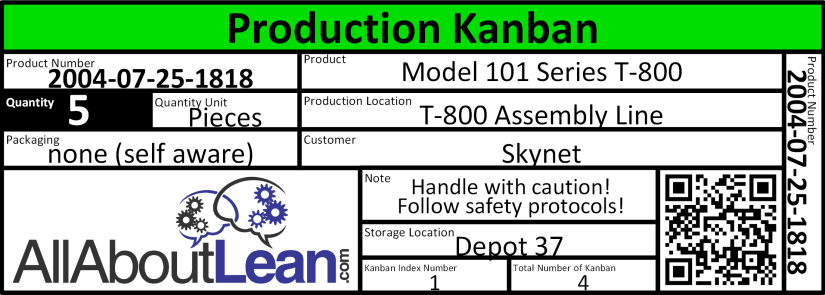A Common Mistake in Doing Lean: Skipping the Details!
Nov 21, 2024
Lean manufacturing is a great set of philosophies and tools to improve your production system, or for that matter any kind of operational system. Yet, many supposed lean implementations fail. One of the various reasons for failure of a lean project is a lack of attention to detail. Let me explain:
Production Systems Are Highly Streamlined

Manufacturing systems are designed for efficiency. If you can produce a product in half the time with the same people and machines, then do it. If you need only half of the inventory, then do it. If you need three people fewer, then do it. If you can make quality better, then do it.
Overall, for thousands of years, production strove to be faster, better, and cheaper. (Literally! I wrote the book on this). Hence, production systems are usually very streamlined. While from the lean point of view there is still a lot of potential, few factories suffer from a glut of resources (people, machines, parts, …). And if they do, the customer suffers from too-expensive products. Hence, production systems overall are not overly robust.
Production Systems Are Highly Complex

Additionally, production systems are very complex and correlated. Change one thing, and something else unrelated could change along with it. While some changes are foreseeable, others you may notice only when they happen… or you may not notice them at all.
In sum, production systems are sensitive to change. If you change something randomly, it is more likely to make the situation worse than better. Even if you change something with the intent of improvement, it may still make it worse due to the delicate nature of production systems.
A Car Analogy

I often like to compare production systems to cars. In terms of complexity, larger production systems are easily as complex as a car. You have delicate interacting mechanical, electrical, and digital systems. The car is also optimized to be… well… faster, better, and cheaper. Hence, changes do sometimes have unintended consequences.
Some stuff is easy to change with little risk (e.g., if you add a new seat cover). However, changing anything on the engine requires a lot of knowledge, and then things still could go wrong. Even just maintaining an engine requires intricate knowledge of the workings of an engine.
Similarly, just maintaining the status quo of a production system requires a lot of effort and knowledge. Changing something can make the system worse even for experienced people. Yet, we do need change to improve, even at the risk of making it worse (and then either changing it again until it works or undoing the change completely).
With a car, nobody would tell the mechanic, “MORE COPPER! I WANT MORE COPPER!” While copper is needed for a car, just asking for more copper does not really make sense. For a car, this is obvious. For a production system, unfortunately not always. Just asking for “MORE KANBAN” is not really helpful.
Copper can be good for a car, and kanban can be good for a production system. But good placement takes a lot of effort and time. This brings me to my key point:
Pay Attention to Detail
When changing anything in a production system, someone needs to pay A LOT of attention to detail. There are many things that can go wrong, or at least be suboptimal.
For example, it is easy to say that you want to implement kanban for one part of your production system (and this already assumes that a kanban is the right solution). Someone has to design the card and think about what information goes where. If crucial information is missing (e.g., then number of parts), then the system may not work at all. If less important information is missing (e.g., the index number of the card), then it will be a lot more effort—in this example, to verify if any card is missing. If unneeded information is added, more effort may be required to find the needed information and at the same time to enter the unneeded information (more wasteful effort).
Someone has to decide on the number of cards, decide on a physical design (plastic cover? metal?…), print the cards, install boxes to store and sort the cards at the different stages in the loops, train the operators, and more. All of that requires a lot of thought. You need to train your people (see my blog post Operator Training at Toyota and Scania for more). And I haven’t even touched the software side of the entire process yet. Your kanban has a barcode or QR code, and this needs to be integrated.
Who Pays Attention?
This brings up the question of who pays attention to all those details? Management is usually not so interested in all the details. While, admittedly, management should not be the person to decide on the design of the kanban card, I feel too many MBAs learn that they just set some KPI targets and the rest will come automatically. IT DOES NOT!
The attention to details should be more on the lower levels of management or on the operational level that knows the system and can estimate what is needed, what is optional, and what is harmful. This someone designs the kanban cards, etc.
Management needs to support this “someone” so they can do their job. They need resources, and especially the time to do their job. In my opinion, a common reason why so many lean projects fail is this lack of attention. Or, in other words, it is a sloppy job.
But please, don’t blame the person taking care of the details for doing sloppy work. They either have not been taught proper lean, or they simply don’t have the time and the resources. They often have too many projects and tasks going on at the same time, and hence they prioritize. Management often starts too many projects, while underestimating the effort needed to do these projects.
It helps if management has done lean (or similar technical projects) before on an operational level. Hopefully they will remember the effort that has to go into a successful project. Another method that helps, and that I will always recommend for lean, is PDCA: Plan, Do, Check, Act. For more on this check out my post The Key to Lean – Plan, Do, Check, Act!
Overall, if you skip the tiny little details, you will put the entire project at risk of failure. I know, this post is much less “hands-on” than I would like my posts to be. However, this post is more about lean philosophy rather than lean tools, and describing philosophy always feels like nailing Jell-O to a wall. Now, go out, pay attention to details, and organize your industry!
Discover more from AllAboutLean.com
Subscribe to get the latest posts sent to your email.
Original Article: https://www.allaboutlean.com/skipping-the-details/
Stay In Touch.
Subscribe to our newsletter and exclusive Leadership content.




